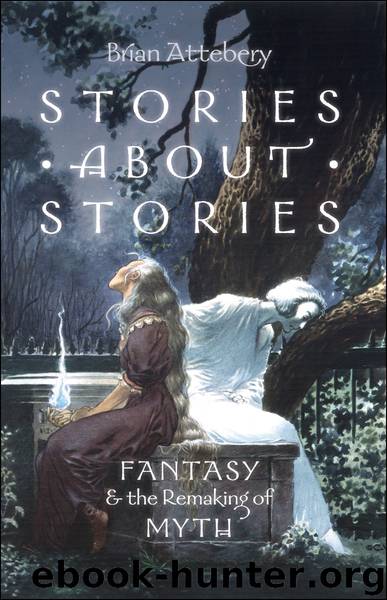Stories about Stories by Attebery Brian

Author:Attebery, Brian
Language: eng
Format: epub
Publisher: Oxford University Press, USA
Published: 2014-03-14T16:00:00+00:00
{ 6 }
Angels, Fantasy, and Belief
A few decades ago, my wife and I were driving in the mountains in a car that did not like to climb mountains. As we stopped by the side to let the carburetor gasp, a kindly soul stopped to see if we were all right. We explained the eccentricities of our Ford Pinto, and the gentleman suggested that perhaps the car was possessed. Had we considered exorcism? He was serious.
At that point I realized that he and I were not living in the same world—that what Kathryn Hume calls “consensus reality” is less of a consensus than it seems (21). In one world (mine) natural processes determine events, whereas in another (that of my roadside Samaritan) a host of invisible beings, helpful or malevolent, fill up space like some kind of spiritual dark matter. This discovery seems less surprising now than it did at the time. The world view that includes angels and demons has been popularized in everything from televised sermons to horror films to self-help books on how to contact your own personal guardian angel. Back in 1969, however, sociologist and theologian Peter L. Berger expressed concern over what he called “the departure of the supernatural” from the modern world (1). Berger described the situation of believers in the supernatural as that of a “cognitive minority,” which he defined as a group of people whose concept of the world differs significantly from the larger society’s (6). A cognitive minority must continually negotiate between its sense of reality and that contrary system upheld by those around it. Such minorities often withdraw into enclaves or cults, or they find ways to assert their views within what Berger calls “hidden nooks and crannies of the culture” (24). One of those hidden nooks is fantasy.
The term “consensus reality” comes from Hume’s definition of the fantastic as deliberate violation of collective assumptions about the way the world is put together. This concept of fantasy as storytelling that knowingly departs from a shared model of reality is enormously useful. It allows us to account for cultural differences and historical changes in the boundary between the fantastic and the real without getting tangled in the thickets of epistemology. In the case of angels and demons, however, consensus reality is an illusion. My Samaritan and I might live in the same place and historical moment; we would undoubtedly use the same terms for such preternatural beings and look to the same cultural sources to understand them. Yet what we might understand from these sources is so different that consensus is a mere patch over a crack that goes right down to the foundations of the real. Fictions about angels offer a way to sort out consensus, dissensus, and any number of gradations in between. Fantasy can serve as a neutral meeting point for differing worldviews and different understandings of religious myth—but only if we agree that what we are reading is fantasy, an agreement that breaks down at exactly the same points where consensus reality fails to hold.
Download
This site does not store any files on its server. We only index and link to content provided by other sites. Please contact the content providers to delete copyright contents if any and email us, we'll remove relevant links or contents immediately.
| Books & Reading | Comparative Literature |
| Criticism & Theory | Genres & Styles |
| Movements & Periods | Reference |
| Regional & Cultural | Women Authors |
4 3 2 1: A Novel by Paul Auster(12354)
The handmaid's tale by Margaret Atwood(7729)
Giovanni's Room by James Baldwin(7301)
Asking the Right Questions: A Guide to Critical Thinking by M. Neil Browne & Stuart M. Keeley(5741)
Big Magic: Creative Living Beyond Fear by Elizabeth Gilbert(5726)
Ego Is the Enemy by Ryan Holiday(5392)
The Body: A Guide for Occupants by Bill Bryson(5065)
On Writing A Memoir of the Craft by Stephen King(4920)
Ken Follett - World without end by Ken Follett(4705)
Adulting by Kelly Williams Brown(4552)
Bluets by Maggie Nelson(4534)
Eat That Frog! by Brian Tracy(4500)
Guilty Pleasures by Laurell K Hamilton(4424)
The Poetry of Pablo Neruda by Pablo Neruda(4079)
Alive: The Story of the Andes Survivors by Piers Paul Read(4010)
White Noise - A Novel by Don DeLillo(3990)
Fingerprints of the Gods by Graham Hancock(3979)
The Book of Joy by Dalai Lama(3960)
The Bookshop by Penelope Fitzgerald(3827)
